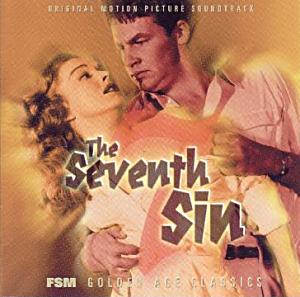The Seventh Sin
Music composed by Miklós Rózsa
Available on: Film Score Monthly (Vol 5 No. 17)
Running Time: 59:26
Available from Film Score Monthly, 8503 Washington Boulevard, Culver City, CA90232; Tel: 1-888-345-6335; overseas: 310-253-9595; fax: 310-253-9588; email: Info@filmscoremonthly.com
Website: http://www.filmscoremonthly.com/

Produced by MGM in 1957, The Seventh Sin was the second filming of W. Somerset Maugham’s The Painted Veil. It was not a success; the stiff acting of Bill Travers (Dr Walter Carwin) and, in this instance, a less than convincing Eleanor Parker as his unfaithful wife, Carol, did not help. The only leading actor to make any impression was George Sanders reprising his familiar cynical, world-weary role as the dissolute Tim Waddington, an Englishman living in a remote region of China to where Dr Carwin is posted from Hong Kong to treat the victims of a cholera outbreak. Waddington encourages Carol to help orphan children so as to escape the bitterness of life with her estranged husband after he had discovered that she had been having an affair in Hong Kong.
Rózsa’s score combines colourful oriental scene-setting material with dramatic almost film noir type of music for the Carwins’s unhappy, tension-filled relationship. The Prelude has a brief Asian-accented fanfare that sets the scene in Hong Kong and the main theme is bold and questing, much like Rózsa’s music for Lust for Life, only darker in mood. The score has many of the familiar Rózsa fingerprints and one might be forgiven for thinking that there is too much routine, too little that is memorable or original in so many of the score’s brooding, troubled cues relating to Carol’s relationships. Even the warmer music associated with her "redemption" in working with the children treads too familiar territory. Having said that, the climactic ‘Bad news/rough passage/forgiveness’ has some quality Rózsa in its intense, dramatic material. The warmest, most truly romantic music in this score is reserved for the relationship between Waddington and his Chinese wife. ‘East Meets West/Tea Party’ is a lovely soothing lyrical interlude – a lovely shimmering blend of Asian melodies and inventive western orchestration. Rózsa’s celebrated knack of faithfully reproducing the spirit of a locale is evident here in his use of striking oriental textures and effects in the travelling cues in ‘Boat Trip’ and ‘Cortege’.
Of this 60-minute album some 19 minutes are devoted to source music comprising a 2˝ minute waltz heard by the Carwins at a Hong Kong party and a colourful, evocative 16˝ minute ‘Chinese Montage’ that uses small ensembles to simulate music frequently heard in Chinese shopping streets. The 12-page booklet includes full track-by-track analysis and details about the production of the film.
Not amongst the most memorable Rózsa scores, but notable for its colourful and often delicate use of oriental harmonies and orchestrations.
Ian Lace
3˝
Return to Index